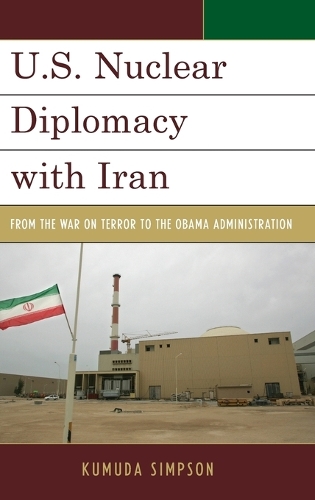
U.S. Nuclear Diplomacy with Iran: From the War on Terror to the Obama Administration
(Hardback)
Publishing Details
U.S. Nuclear Diplomacy with Iran: From the War on Terror to the Obama Administration
By (Author) Kumuda Simpson
Bloomsbury Publishing PLC
Rowman & Littlefield Publishers
24th December 2015
United States
Classifications
Professional and Scholarly
Non Fiction
Arms negotiation and control
327.1740955
Physical Properties
Hardback
202
Width 157mm, Height 239mm, Spine 19mm
417g
Description
The United States commitment to non-proliferation often propels its foreign policy rhetoric. In 2002, George W. Bush framed his goal of preventing the spread of nuclear weapons within the context of the global war on terror, accusing Iran of being part of the Axis of Evil. Irans nuclear program was declared an intolerable threat to global peace and stability. This approach however showed the conflict between the rhetoric of good vs. evil and the need for a pragmatic and measured approach to non-proliferation in the Middle East. The book explores this divergence between the alarmist rhetoric of the Bush Administrations public diplomacy and its actual non-proliferation policy toward Iran. It shows how the two policy directions, the war on terror and negotiations over the nuclear issue, were often at odds. Further, the Administrations desire to change the regime in Iran undermined efforts to find a diplomatic solution to the nuclear issue. Ultimately, the policies implemented failed both to shut down Irans nuclear program and bring significant democratic reform within the Islamic Republic. The book also examines this legacy and how Obamas approach differs or follows that of his predecessor. Lastly, the implications for non-proliferation policies beyond Iran are discussed, as nuclear proliferation remains a key concern in a Middle East plagued by instability.
Reviews
Kumuda Simpson has produced a carefully researched book on a topic that is so often misunderstood. By placing Irans nuclear deal in the broad context of turbulent relations between the United States and Iran, as well as the regional dynamics, Simpson offers a penetrating and comprehensive analysis. This is a must-read for anyone trying to make sense of Irans future in the Persian Gulf. -- Shahram Akbarzadeh, Professor of Middle East and Central Asian Politics, Deakin University
Kumuda Simpsons clear-eyed and balanced account of U.S. nuclear policy toward Iran under Bush and Obama shows that history matters. But Simpsons real contribution to the debate is to show that what matters more are the enduring and mutually disabling effects of the stories the players tell about themselves and the demonized other side. Simpsons U.S.-Iran lucid case study also provides a a more generally salient guide to pathways out of a security dilemma. -- Richard Tanter, senior research associate, Nautilus Institute; professor in the School of Political and Social Studies, University of Melbourne, Australia
Author Bio
Kumuda Simpson is a lecturer in international relations in the Department of Politics and Philosophy at La Trobe University in Melbourne, Australia.
